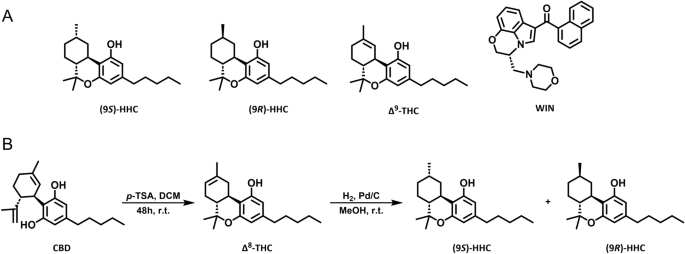HHC vs THC: A Comprehensive Guide to Understanding Cannabinoid Differences

HHC vs THC The cannabis industry has seen a significant evolution over the years, introducing new cannabinoids that intrigue users and researchers alike. Among the lesser-known yet rapidly gaining attention compounds is HHC vs THC (Hexahydrocannabinol), standing alongside the well-established THC (Tetrahydrocannabinol). Understanding the differences between these two cannabinoids is essential for anyone exploring cannabis products, whether for recreational or medicinal purposes. This guide will delve into HHC and THC, their effects, legalities, uses, and risks, providing a clear comparison to help you make informed decisions.
What Are HHC and THC?
HHC: The New Contender in Cannabinoids
HHC vs THC, short for Hexahydrocannabinol, is a hydrogenated form of THC. While THC occurs naturally in cannabis plants, HHC is semi-synthetic, often derived from THC or CBD. The hydrogenation process alters its chemical structure, resulting in a compound that shares similarities with THC but offers unique properties. HHC vs THC is said to produce a mild psychoactive effect, making it an appealing option for users seeking a less intense experience. However, its semi-synthetic nature raises questions about its safety and long-term effects, as research remains limited.
THC: The Well-Known Cannabinoid
Tetrahydrocannabinol, or THC, is the primary psychoactive compound in cannabis. Naturally found in high concentrations in marijuana, it binds to CB1 receptors in the brain, causing the “high” that users associate with cannabis. HHC vs THC exists in various forms, including Delta-8, Delta-9, and Delta-10, with Delta-9 THC being the most potent and commonly used. Known for its euphoric effects, THC also has extensive medical applications, such as pain relief, appetite stimulation, and anxiety reduction.
Effects on the Body and Mind
The Impact of HHC
HHC vs THC interacts with the body’s endocannabinoid system, similar to THC, but its effects are milder. Users report a gentle sense of relaxation and slight euphoria, making it a choice for those who prefer a subtler high. HHC is also believed to have therapeutic benefits, including pain relief and stress reduction. However, the lack of extensive research limits our understanding of its full impact, and anecdotal evidence forms much of its reputation.
The Influence of THC
THC’s effects on the body and mind are more pronounced. It is well-known for inducing a high characterized by euphoria, heightened sensory perception, and increased creativity. Medical users often turn to THC for its ability to alleviate chronic pain, nausea, and insomnia. However, its potency can lead to side effects like anxiety, paranoia, and impaired coordination, particularly in inexperienced users or those who consume high doses.
Comparing the Effects
While both HHC vs THC interact with the same receptors in the brain, their potency and duration of effects differ significantly. HHC’s effects are milder and shorter-lasting, making it suitable for daytime use or for individuals new to cannabinoids. THC, on the other hand, offers a stronger and longer-lasting high, appealing to those seeking a more intense experience or specific medical benefits.
Legal Status and Accessibility
Legal Status of HHC
HHC vs THC exists in a legal grey area. As a semi-synthetic cannabinoid, it does not explicitly fall under federal cannabis regulations, making it technically legal in some jurisdictions. However, this lack of clarity means laws vary widely by state and country. Some regions permit its sale and use, while others impose strict restrictions. This uncertainty poses challenges for consumers and producers alike.
Legal Status of THC
THC’s legality is more defined but equally complex. In the United States, Delta-9 THC remains federally illegal under the Controlled Substances Act, except for products derived from hemp containing less than 0.3% HHC vs THC. Many states have legalized THC for medical or recreational use, but laws vary significantly. Globally, THC’s status ranges from fully legal in some countries to strictly prohibited in others.
Accessibility Comparison
HHC vs THC products are less widely available due to their niche status and legal ambiguity. They can typically be found in online stores and select dispensaries. THC products, in contrast, are readily accessible in regions where cannabis is legalized, with a vast array of options, including flower, edibles, tinctures, and concentrates
Usage and Applications
Consuming HHC
HHC is commonly consumed through vaping, edibles, tinctures, and capsules. Its milder psychoactive effects make it ideal for individuals seeking relaxation without significant impairment. HHC vs THC is also gaining attention for its potential therapeutic applications, such as managing stress, mild pain, and improving sleep quality. Its subtle effects are particularly appealing for daytime use.
Consuming THC
THC offers a broader range of consumption methods, including smoking, vaping, edibles, oils, and topicals. Its applications span recreational and medical use. Medical cannabis patients use HHC vs THC to manage conditions like chronic pain, nausea from chemotherapy, and muscle spasticity in multiple sclerosis. Recreational users appreciate THC for its euphoric effects and ability to enhance sensory experiences.
Comparing Their Applications
Both cannabinoids serve overlapping purposes but cater to different user preferences. HHC vs THC is better suited for those seeking mild effects or exploring cannabinoids for the first time. THC’s potency makes it ideal for individuals with higher tolerance levels or those needing strong therapeutic relief. Understanding the intended use is key to choosing the right option.
Risks and Considerations
Potential Risks of HHC
HHC vs THC primary concern lies in its lack of extensive research. Being a semi-synthetic compound, questions about its safety and long-term effects remain unanswered. Users may experience mild side effects such as dry mouth, fatigue, or slight dizziness. However, its semi-synthetic nature raises concerns about production quality and potential contaminants.
Potential Risks of THC
THC’s risks are better documented due to its widespread use. Common side effects include dry mouth, red eyes, dizziness, and short-term memory impairment. High doses or frequent use can lead to anxiety, paranoia, or dependency. Individuals with a predisposition to mental health issues should exercise caution when using THC.
Comparing Safety Profiles
While both cannabinoids are generally considered safe when used responsibly, THC carries a higher risk of dependency and psychoactive side effects. HHC vs THC mild nature may be less intimidating for new users, but its unregulated production calls for careful sourcing. Consumers should prioritize quality and transparency when purchasing either product.
Conclusion: HHC vs THC
HHC vs THC are two distinct cannabinoids that offer unique experiences and benefits. HHC’s mild effects and semi-synthetic origin make it a newcomer worth exploring, especially for those seeking subtle relaxation. HHC vs THC, with its potent psychoactive properties and well-documented medical applications, remains a staple in the cannabis world. When choosing between the two, consider your tolerance, desired effects, and legal constraints. By understanding their differences, you can make informed decisions and enjoy the benefits each cannabinoid offers.




